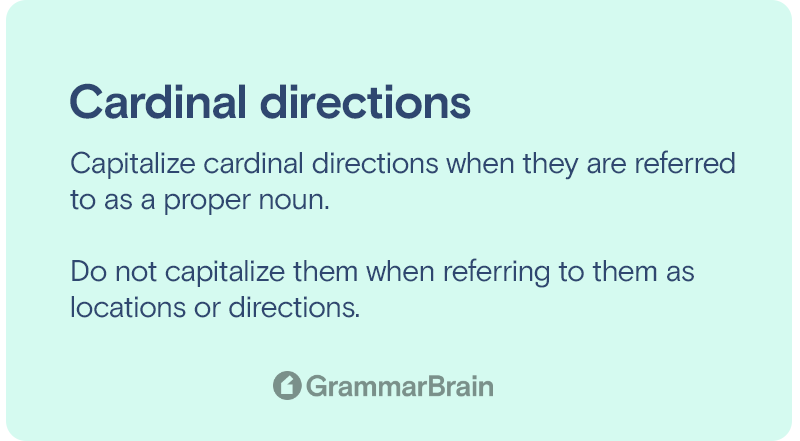When do you capitalized cardinal direction? This is a question you may have asked yourself when captioning a photo from your vacation. A caption like, “a cuckoo clock from the south” or “cuckoo clock from from the South?”
It can be confusing to determine whether to capitalize or not to capitalize cardinal directions. In this article, we’re going to cover how and when to capitalize these types of directions and locations.
Let’s jump in…

What Are Cardinal Directions?
In geography and astronomy, a cardinal point is a point on the horizon that serves to orient itself. Cardinal directions are used to navigate a car, navigate in a city, or in the wild. Or when using a map or a compass. The cardinal point gives the direction to follow.
On a map, a weather vane, or a compass, there are typically four cardinal points inscribed to portray these directions (north, south, east, and west).
The four cardinal points are north, south, east, and west. Thanks to these points, we can determine the position of all the other points on a map, accordingly. We also speak of cardinal points to designate the winds that come from the four cardinal points. For example, “the winds are coming from the East.”
When to Capitalize Directions
Directives (or cardinal directions) should get capitalized when whenever written. And especially under particular instances in a sentence.
When cardinal directions are a part of proper names, you should capitalize them. Proper names should always get capitalized.
For instance, you should capitalize the cardinal directions west if your home is on the West Coast. This is due to the fact that it becomes a proper noun when combined with the term coast.
Lowercase use is mostly used for referencing the cardinal point. For example, we write the “west wind,” all in lowercase. Because it is the wind that comes from the cardinal point called “west.” or “The further north you go, the colder it gets!”
For example:
- This comic film sings of the hospitality of the people of the North.
- The Canary Islands are located in western Africa.
When Not to Capitalize Directions
When referring to direction and location, do not capitalize words like north, south, east, or west. However, capitalize these words when they appear to references the names of places and regions.
What does it mean to capitalize the word if it designates a region? For example, “in the West,” implies in the West region.
A capital letter of the direction can also designate a political entity.
For example:
- Strasbourg is further east than Nancy.
- The further north you go, the harsher the climate.
Examples of Capitalization of Cardinal Directions
Example 1:
Andalusia is located in the south of Spain.
Reason: The noun “south” must here be written with a lowercase letter because it is followed by a complement which determines it (“of Spain”). This is a correct sentence.
Example 2:
This tireless traveler has been everywhere except South America.
Reason: The name “south” enters here into a denomination that refers to a well-defined geographical unit: it must be capitalized.
Example 3:
The further north you go, the harsher the climate becomes.
Reason: It is not a question here of the department or of a well-defined geographical region, but of the cardinal point. It is therefore, the lowercase letter is essential.
Example 4:
The Canary Islands are located west of Africa.
Reason: Because the noun “west” is here followed by a complement (“of Africa”), the lowercase letter is self-evident.
Example 5:
The Eastern bloc was shattered in the last years of the 20th century.
Reason: The name here doesn’t designate the cardinal point. But refers to a specific political entity, namely the communist reference of bloc, hence the capital letter.
Examples of Locations That are Capitalized
- Deep south
- Western hemisphere
- West Virginia
- Middle East
- Western region
- East coast
- Northern Ireland
- Eastern Seaboard
- Pacific Northwest
- Northern hemisphere
- Southern California
- Eastern medicine
- Western Europe
FAQs
Why aren’t directions capitalized?
The words north, south, east, west, and derivatives are capitalized when they designate definite regions or are an integral part of a proper name (like a proper noun). Don’t capitalize these words when they simply indicate a direction or general location.
Are cardinal directions capitalized?
Cardinal directions should get capitalized when used as proper nouns. In these situations, they serve to define a specific location and are become proper names. On the other hand, don’t capitalize them if they just relate to a general place or general direction.
When to capitalize East, West, North, and South?
When used as compass directions or as components of proper nouns or adjectives to refer to areas or geographies, the traditional suggestion is to shorten north, south, east, and west describes regions.
Inside this article
Fact checked:
Content is rigorously reviewed by a team of qualified and experienced fact checkers. Fact checkers review articles for factual accuracy, relevance, and timeliness. Learn more.
Core lessons
Glossary
- Abstract Noun
- Accusative Case
- Anecdote
- Antonym
- Active Sentence
- Adverb
- Adjective
- Allegory
- Alliteration
- Adjective Clause
- Adjective Phrase
- Ampersand
- Anastrophe
- Adverbial Clause
- Appositive Phrase
- Clause
- Compound Adjective
- Complex Sentence
- Compound Words
- Compound Predicate
- Common Noun
- Comparative Adjective
- Comparative and Superlative
- Compound Noun
- Compound Subject
- Compound Sentence
- Copular Verb
- Collective Noun
- Colloquialism
- Conciseness
- Consonance
- Conditional
- Concrete Noun
- Conjunction
- Conjugation
- Conditional Sentence
- Comma Splice
- Correlative Conjunction
- Coordinating Conjunction
- Coordinate Adjective
- Cumulative Adjective
- Dative Case
- Determiner
- Declarative Sentence
- Declarative Statement
- Direct Object Pronoun
- Direct Object
- Diction
- Diphthong
- Dangling Modifier
- Demonstrative Pronoun
- Demonstrative Adjective
- Direct Characterization
- Definite Article
- Doublespeak
- False Dilemma Fallacy
- Future Perfect Progressive
- Future Simple
- Future Perfect Continuous
- Future Perfect
- First Conditional
- Irregular Adjective
- Irregular Verb
- Imperative Sentence
- Indefinite Article
- Intransitive Verb
- Introductory Phrase
- Indefinite Pronoun
- Indirect Characterization
- Interrogative Sentence
- Intensive Pronoun
- Inanimate Object
- Indefinite Tense
- Infinitive Phrase
- Interjection
- Intensifier
- Infinitive
- Indicative Mood
- Participle
- Parallelism
- Prepositional Phrase
- Past Simple Tense
- Past Continuous Tense
- Past Perfect Tense
- Past Progressive Tense
- Present Simple Tense
- Present Perfect Tense
- Personal Pronoun
- Personification
- Persuasive Writing
- Parallel Structure
- Phrasal Verb
- Predicate Adjective
- Predicate Nominative
- Phonetic Language
- Plural Noun
- Punctuation
- Punctuation Marks
- Preposition
- Preposition of Place
- Parts of Speech
- Possessive Adjective
- Possessive Determiner
- Possessive Case
- Possessive Noun
- Proper Adjective
- Proper Noun
- Present Participle
- Prefix
- Predicate



